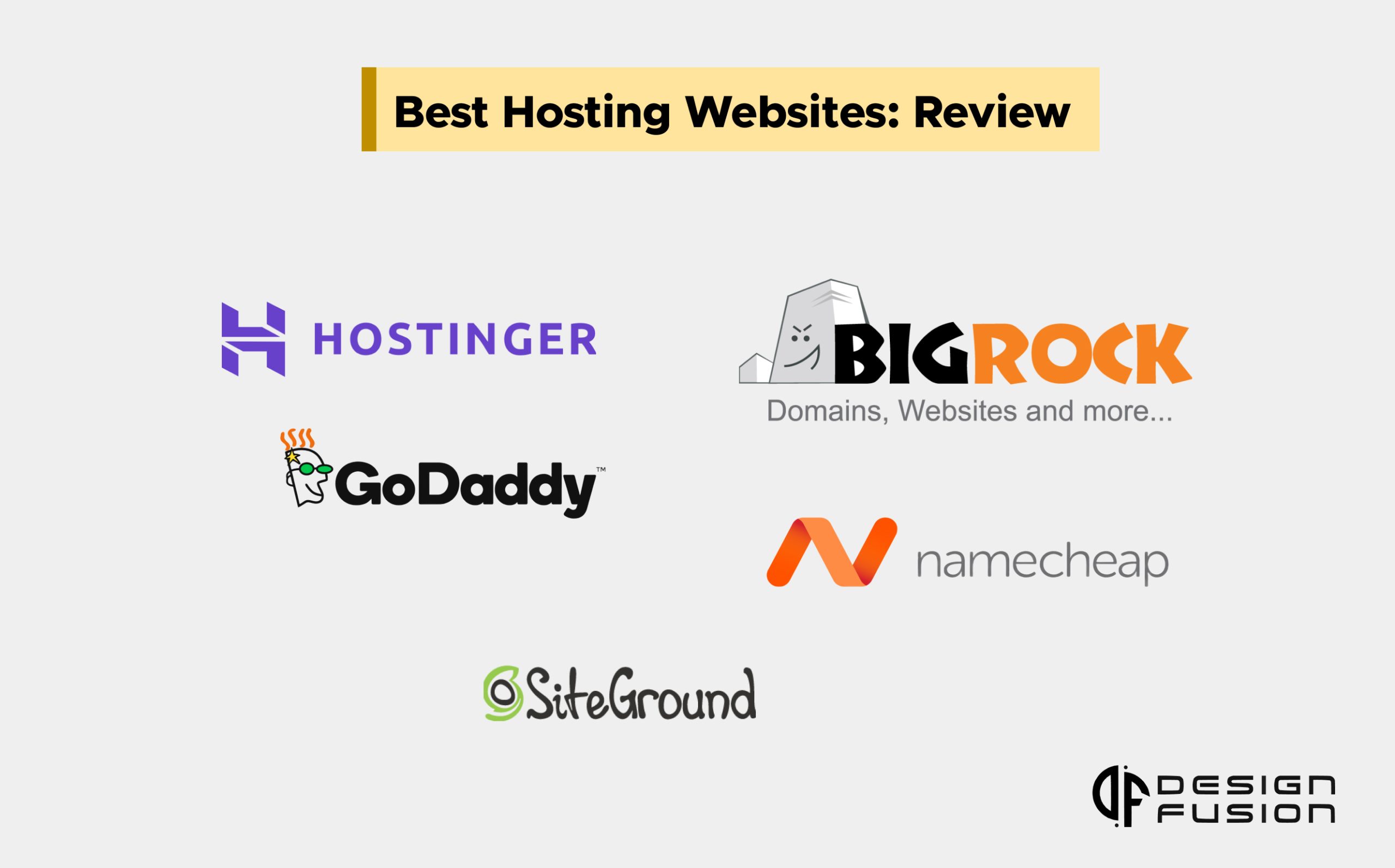In the digital age, your website’s success largely depends on your choice of hosting provider. The right host can ensure your site runs smoothly, loads quickly, and remains secure. With numerous hosting providers available, it can be challenging to determine which one is best for your needs. In this blog, we will delve into the world of web hosting and review seven prominent providers: Hostinger, SiteGround, Bluehost, HostGator, Namecheap, BigRock, and GoDaddy. Let’s explore their strengths, weaknesses, and which one might be the best fit for your website.
Hostinger is a game-changer when it comes to budget-friendly hosting. With an emphasis on affordability, they offer a range of hosting services, including shared hosting, cloud hosting, and VPS hosting. Hostinger provides excellent value for the cost-conscious website owner.
Pros of Hostinger Hosting:
- Affordable Pricing: Hostinger is well-known for its cost-effective hosting solutions. This makes it an attractive option for startups, small businesses, and individuals working on a limited budget.
- Solid Performance: Despite its low costs, Hostinger doesn’t sacrifice performance. They offer excellent loading speeds and reliable uptime, ensuring that your website remains accessible and responsive.
- User-Friendly Control Panel: Hostinger’s control panel is intuitive and user-friendly, making it an excellent choice for beginners. You can easily manage your website, domains, and other hosting features.
- Excellent Customer Support: Hostinger provides customer support via live chat and a ticketing system. While it’s not 24/7, the support is generally responsive and helpful.
- Free Domain and SSL: Many Hostinger plans include a free domain and SSL certificate, simplifying the process of securing your website and establishing your online identity.
Cons of Hostinger Hosting:
- Limited Advanced Features: Hostinger’s lower pricing comes with some trade-offs. If you require advanced features and scalability, you might find the options somewhat restricted compared to more expensive hosting providers.
- Customer Support Availability: While Hostinger’s customer support is generally helpful, it’s not available 24/7. This could be a drawback for users who require assistance at any time of day.
- Fewer Data Centers: Hostinger has data centers in fewer locations compared to some competitors. If your target audience is primarily located outside of these regions, you might experience slightly slower site speeds.
SiteGround
SiteGround is known for its exceptional customer support and impressive performance. It’s highly recommended for hosting WordPress sites and is celebrated for its reliability and top-notch security features.
Pros of SiteGround Hosting:
- Outstanding Customer Support: SiteGround is renowned for its top-tier customer support. They offer 24/7 assistance via live chat, phone, and ticketing system, ensuring that you can get help when you need it.
- Exceptional Performance: SiteGround is a leader in terms of speed and reliability. With advanced technologies like SSD storage and a content delivery network (CDN), your website is guaranteed to load quickly and efficiently.
- Robust Security Features: SiteGround places a strong emphasis on security. They offer features like free daily backups, a web application firewall, and proactive monitoring to keep your site safe from threats.
- WordPress Optimization: SiteGround is officially recommended by WordPress. They provide specialized hosting for WordPress, including one-click installations, automatic updates, and staging environments for testing.
- Data Center Options: SiteGround has data centers in various locations worldwide, allowing you to choose a server location that’s closest to your target audience, resulting in faster site speeds.
Cons of SiteGround Hosting:
- Pricing: While SiteGround offers premium hosting, it comes at a higher cost than some budget-friendly options. However, many users find the performance and support justify the price.
- Limited Storage: SiteGround’s shared hosting plans have storage limitations that may not suit websites with substantial data or media content.
Bluehost
As one of the officially recommended hosting providers by WordPress, Bluehost is a household name in the hosting world. They provide an extensive selection of hosting services, encompassing shared hosting, VPS hosting, and dedicated hosting.
Pros of Bluehost Hosting:
- WordPress-Friendly: Bluehost is officially recommended by WordPress and is optimized for WordPress websites. They offer one-click installations, automatic updates, and a user-friendly dashboard tailored for WordPress users.
- Strong Uptime and Performance: Bluehost is known for its robust uptime and impressive loading speeds, ensuring your website remains accessible and responsive to visitors.
- User-Friendly Interface: Bluehost’s control panel is intuitive and user-friendly, making it suitable for beginners and experienced developers alike.
- Variety of Hosting Options: Bluehost provides a variety of hosting services, including shared hosting, VPS hosting, and dedicated hosting, offering flexibility for your specific project needs.
Cons of Bluehost Hosting:
- Renewal Pricing: While Bluehost offers competitive introductory pricing, renewal prices can be higher. It’s important to consider long-term costs when choosing your hosting plan.
- Additional Costs for Advanced Features: Some advanced features may require additional payments, so be sure to review your chosen plan to understand the full range of features available.
HostGator
HostGator is well-known for its user-friendly hosting options and reputation for reliability. They offer shared hosting, VPS hosting, and dedicated hosting plans.
Pros of HostGator Hosting:
- Variety of Hosting Options: HostGator provides a wide range of hosting services, including shared hosting, VPS hosting, and dedicated hosting. This versatility allows you to choose the right solution for your specific needs.
- Strong Uptime and Reliability: HostGator boasts excellent uptime, ensuring your website remains accessible to users around the clock. Reliable hosting is crucial for online success.
- 45-Day Money-Back Guarantee: HostGator offers a generous 45-day money-back guarantee, giving you ample time to test their services and assess whether they meet your requirements.
- User-Friendly Interface: HostGator’s control panel is user-friendly, making it easy for beginners to navigate and manage their websites and hosting features.
- Customer Support: HostGator’s customer support is responsive and helpful. They offer assistance via live chat, phone, and a ticketing system.
Cons of HostGator Hosting:
- Inconsistent Customer Support: While HostGator generally provides good customer support, some users have reported inconsistent experiences with response times and resolutions.
- Additional Costs for Advanced Features: Some advanced features and tools may require extra payments. Make sure to review the specific features included in your chosen plan to avoid unexpected costs.
Although primarily recognized as a domain registrar, Namecheap also provides hosting services. Known for its affordability and user-friendly approach, it’s a suitable option for beginners and those on a tight budget.
Pros of Namecheap Hosting:
- Affordable Pricing: Namecheap’s hosting services are known for their budget-friendly pricing, making them an excellent choice for individuals and small businesses with limited budgets.
- User-Friendly Interface: Namecheap’s control panel is intuitive and beginner-friendly, allowing users to easily manage their websites, domains, and hosting settings.
- Free Website Builder: Namecheap provides a free website builder with their hosting packages, enabling beginners to create and design websites without extensive technical knowledge.
- Domain Registration Services: As a well-established domain registrar, Namecheap offers seamless domain registration and management, streamlining the process of establishing your online presence.
Cons of Namecheap Hosting:
- Limited Data Center Locations: Namecheap has data centers primarily in the US and the UK. This limited geographical coverage may result in slightly slower site speeds for visitors outside these regions.
- Fewer Advanced Features: While Namecheap offers essential hosting features, it may lack some of the advanced features found with more premium hosting providers.
BigRock
BigRock is an India-based hosting provider offering various hosting services. With localized customer support and data centers in India, they cater to the Indian market effectively.
Pros of BigRock Hosting:
- Localized Support: BigRock is uniquely positioned to offer localized customer support, making it an excellent choice for businesses and individuals in India who prefer assistance in their local language and time zone.
- Data Centers in India: With data centers located in India, BigRock can provide faster site speeds for websites targeting the Indian audience, improving user experience and search engine rankings.
- Competitive Pricing for Indian Customers: BigRock offers competitive pricing that’s well-suited to the Indian market, making it an economical choice for those on a budget.
- Variety of Hosting Options: BigRock provides a variety of hosting services, including shared hosting, VPS hosting, and dedicated hosting, allowing you to choose the most suitable solution for your specific project.
Cons of BigRock Hosting:
- Limited Global Reach: While BigRock excels in serving the Indian market, it may not be the best choice for websites with a global audience, as the data centers are primarily located in India.
- Possible Slower Speeds for Non-Indian Audiences: Visitors from outside India may experience slightly slower site speeds due to the concentration of data centers in a specific geographic location.
GoDaddy
GoDaddy is one of the most recognizable names in the hosting and domain industry. They offer a variety of hosting services along with domain registration. It’s a user-friendly option with a strong brand presence.
Pros of GoDaddy Hosting:
- Easy Domain Registration: GoDaddy is renowned for its straightforward domain registration process, making it an ideal choice for individuals and businesses looking to secure their online identity.
- User-Friendly Website Builder: GoDaddy provides a user-friendly website builder that simplifies the process of creating and designing websites, especially for beginners.
- Strong Brand Recognition: GoDaddy’s brand is widely recognized, which can provide a sense of trust and reliability to users considering its hosting services.
- Diverse Hosting Services: GoDaddy offers a range of hosting options, from shared hosting to dedicated hosting, allowing you to select the most appropriate solution for your website development project.
Cons of GoDaddy Hosting:
- Mixed Customer Support Reviews: While GoDaddy does offer customer support, the reviews regarding the quality and responsiveness of that support are mixed.
- Not Always the Most Competitive Pricing: GoDaddy’s pricing may not always be the most competitive, and it’s advisable to explore other options to ensure you get the best value for your budget.
Conclusion
Selecting the best hosting provider among Hostinger, SiteGround, Bluehost, HostGator, Namecheap, BigRock, and GoDaddy depends on your unique needs and preferences. While each of these hosting providers has its strengths and weaknesses, it’s crucial to align your choice with your website’s specific requirements, budget, and growth potential.
Before making a decision, carefully evaluate the latest features, pricing, and user reviews to ensure you select the hosting provider that best suits your website’s needs. Your hosting choice is a critical foundation for your online presence, so make it wisely to pave the way for your website’s success.




